Daily Vocabulary Words: List of Daily Used Words in Leading International Newspapers
Hi there. Welcome to this special section @ Wordpandit.
Our endeavour here is very simple: to highlight important daily vocabulary words, which you would come across in leading newspapers in the country. We have included the following newspapers in our selection:
• The New York Times
• The Washington Post
• Scientific American
• BBC
• The Guardian
• Psychology Today
• Wall Street Journal
• The Economist
We are putting in extensive work for developing your vocabulary. All you have got to do is be regular with this section and check out this post on a daily basis. This is your repository of words that are commonly used and essentially, we are posting a list of daily used words. Hence, this has significant practical application as it teaches you words that are used commonly in leading publications mentioned above.
Visit the website daily to learn words from leading international newspapers.
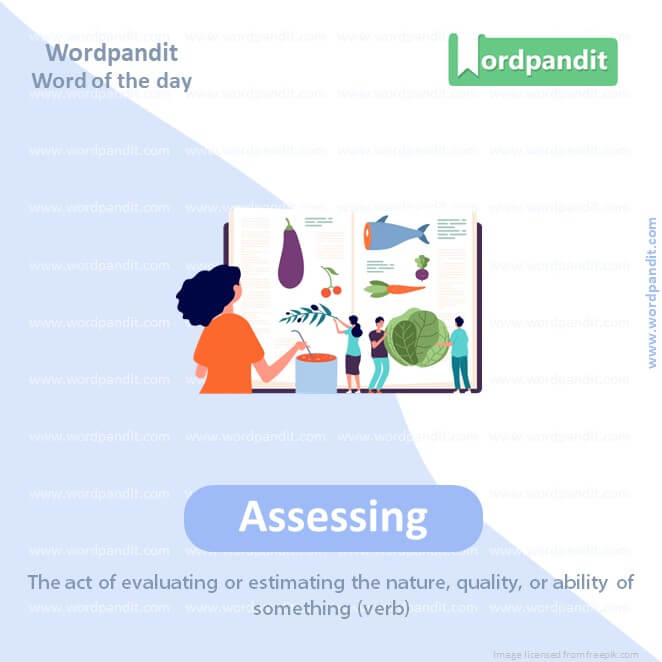
WORD-1: Assessing
CONTEXT: That does not mean we should shrink from honestly assessing performance, including economic performance, under Mr. Trump as well as under Mr. Biden.
SOURCE: New York Times
EXPLANATORY PARAGRAPH: Imagine looking at your toy collection and deciding which one you want to play with first. That’s like “assessing.” It means looking carefully at something and figuring out what’s good or bad about it, like checking your homework to see if it’s correct or deciding which game to play based on how much fun you think it’ll be.
MEANING: The act of evaluating or estimating the nature, ability, or quality, or ability of something (verb).
PRONUNCIATION: uh-SESS-ing
SYNONYMS: evaluating, analyzing, appraising, judging, gauging, determining
USAGE EXAMPLES:
1. The teacher spent hours assessing the students’ essays.
2. The doctor is currently assessing the patient’s condition.
3. She is assessing different options before making a decision.
4. The company is assessing the impact of the new policy on its employees.
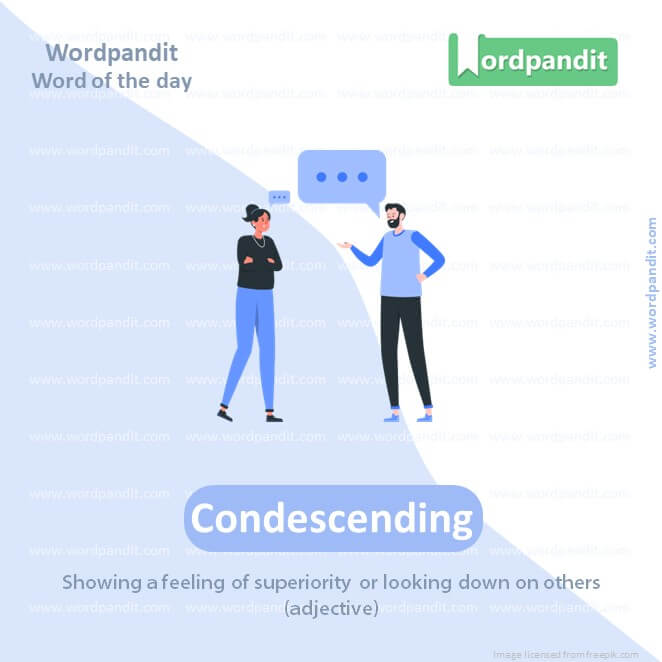
WORD-2: Condescending
CONTEXT: Democrats should have learned by now condescending to Trump voters will not win many of them over.
SOURCE: New York Times
EXPLANATORY PARAGRAPH: Imagine someone talking down to you like you’re a little kid, even though you’re a big kid now. That’s like “condescending.” It means acting as if you’re better or smarter than someone else and treating them like they’re not important or inferior.
MEANING: Showing an attitude of superiority or looking down to others (adjective).
PRONUNCIATION: kon-duh-SEND-ing
SYNONYMS: patronizing, arrogant, superior, disdainful, haughty, snobbish
USAGE EXAMPLES:
1. Her condescending tone made her classmates feel small.
2. The manager’s condescending attitude toward his employees created a tense work environment.
3. He spoke in a condescending manner, as if explaining something simple to a child.
4. The condescending remarks from her colleague made her feel undervalued.
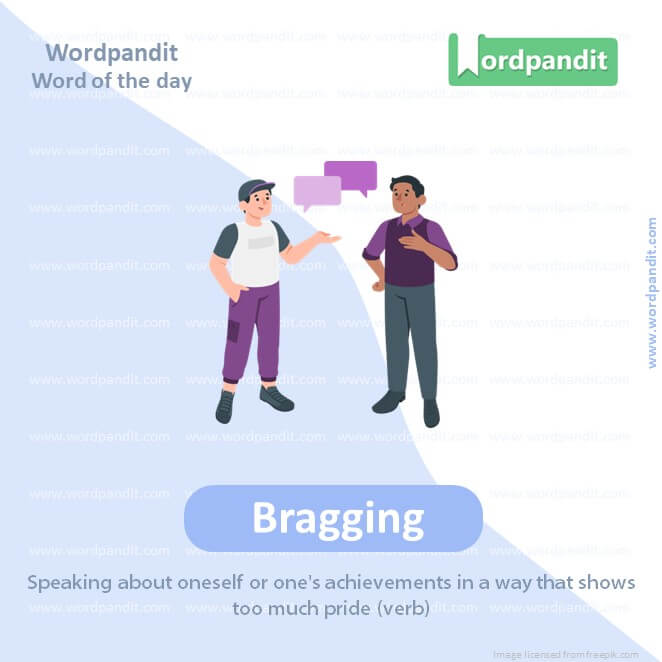
WORD-3: Bragging
CONTEXT: Whenever a candidate boasts, like DeSantis, that he’s visited all 99 counties in Iowa, you hear a shriek of desperation mixed in with the bragging.
SOURCE: New York Times
EXPLANATORY PARAGRAPH: Imagine someone telling you all the great things they’ve done, like scoring a goal in soccer or winning a spelling bee. That’s like “bragging.” It means talking a lot about yourself and your achievements, like saying how smart you are or how many friends you have.
MEANING: Speaking about onself or one’s achievements in a way that shows too much pride (verb/noun).
PRONUNCIATION: BRAG-ing
SYNONYMS: boasting, bragging, showing off, crowing, gloating, swaggering
USAGE EXAMPLES:
1. He was bragging about his new car to anyone who would listen.
2. Her constant bragging about her grades annoyed her classmates.
3. Bragging about your accomplishments may make others feel inadequate.
4. His bragging about his wealth made his friends uncomfortable.
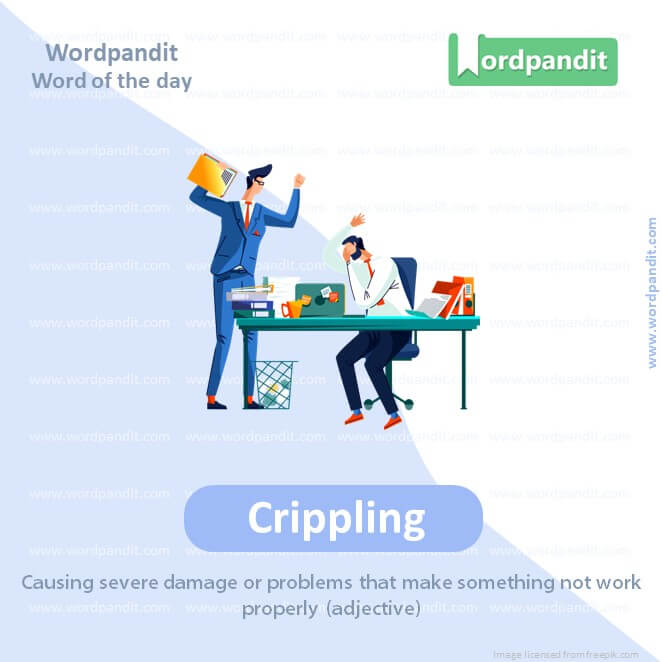
WORD-4: Crippling
CONTEXT: Gonna ask you to give the systems more time to recover from the crippling effects of the pandemic.
SOURCE: New York Times
EXPLANATORY PARAGRAPH: Imagine someone tying your shoelaces together so you can’t walk properly. That’s like something “crippling.” It means making something unable to work or function properly, like breaking a toy so it can’t move or injuring your leg so you can’t run.
MEANING: Causing severe damage or problems that make something not work properly (adjective/verb).
PRONUNCIATION: KRI-pling
SYNONYMS: debilitating, disabling, paralyzing, incapacitating, impairing, damaging
USAGE EXAMPLES:
1. The company faced crippling losses due to the economic downturn.
2. His arthritis became so crippling that he could no longer work.
3. The hurricane left behind crippling damage to homes and infrastructure.
4. The disease had a crippling effect on her ability to walk.
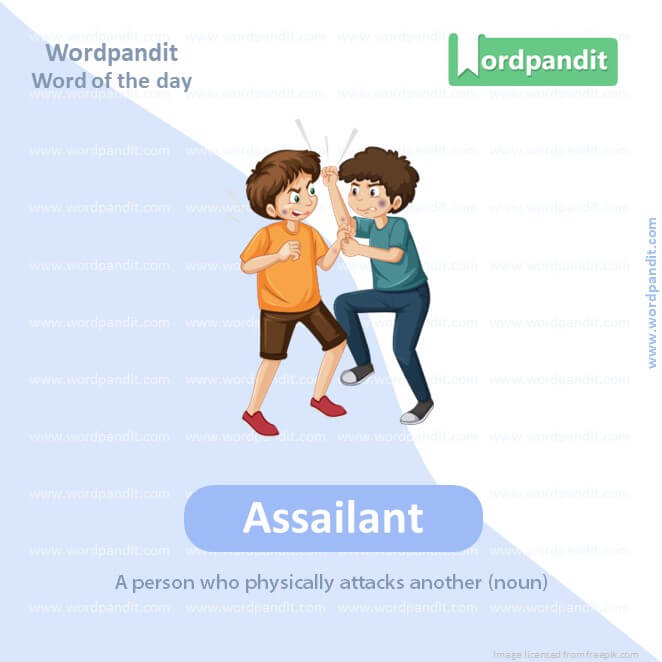
WORD-5: Assailant
CONTEXT: Thanks to the inaction of Republican legislators, there is nothing to stop the next would-be assailant from doing the same thing.
SOURCE: New York Times
EXPLANATORY PARAGRAPH: Imagine playing a game where someone unexpectedly jumps out and scares you. That’s like an “assailant.” It’s someone who attacks or tries to harm someone else, like a bully who hits you on the playground or a robber who steals your lunch money.
MEANING: A person who physically attacks another (noun).
PRONUNCIATION: uh-SEY-luhnt
SYNONYMS: attacker, aggressor, assailant, perpetrator, antagonist, offender
USAGE EXAMPLES:
1. The victim was unable to identify her assailant to the police.
2. The assailant was apprehended by bystanders before he could escape.
3. The victim fought off her assailant and escaped.
4. Police are searching for the assailant responsible for the recent string of robberies.
WORD-6: Afflicting
CONTEXT: Even whiteness and wealth, which insulate lawmakers from all manner of suffering afflicting their fellow Tennesseans, are no guarantee of safety in a state that’s flooded with guns.
SOURCE: New York Times
EXPLANATORY PARAGRAPH: Imagine having a headache so bad you can’t focus on your favorite TV show or play with your toys. That’s like “afflicting.” It means causing someone pain or suffering, like getting sick with the flu or feeling sad because a friend moved away.
MEANING: Causing pain, suffering, or distress to someone or something (verb).
PRONUNCIATION: uh-FLIKT-ing
SYNONYMS: tormenting, troubling, plaguing, distressing, burdening, bedeviling
USAGE EXAMPLES:
1. The disease afflicting the community spread rapidly.
2. Poverty continues to afflict millions of people around the world.
3. The drought is afflicting farmers, causing crops to wither.
4. The family was afflicted by a series of misfortunes.
WORD-7: Ammunition
CONTEXT: Four young people of color were gunned down in a Waffle House restaurant by a deranged white assailant wearing nothing but an ammunition vest.
SOURCE: New York Times
EXPLANATORY PARAGRAPH: Imagine going on an adventure with your friends and bringing along your trusty toy sword and shield. That’s like “ammunition.” It refers to the materials, like bullets or arrows, used in weapons like guns or bows. Just like how you need a toy sword to play knights, soldiers need ammunition to defend themselves or to attack enemies in battles.
MEANING: The materials used in weapons such as guns, cannons, or bows; typically refers to bullets, shells, or cartridges (noun).
PRONUNCIATION: am-yuh-NISH-uhn
SYNONYMS: bullets, cartridges, shells, rounds, projectiles, munitions
USAGE EXAMPLES:
1. The soldiers loaded their rifles with ammunition before heading into battle.
2. The police confiscated a cache of illegal ammunition from the suspect’s house.
3. The hunters carried enough ammunition for their rifles to last the entire hunting trip.
4. Military forces rely on a steady supply of ammunition to maintain their operations.
WORD-8: Enshrined
CONTEXT: Dr. Metzl has become convinced that long-enshrined arguments for gun safety must be reconsidered and recast to move beyond traditional side taking.
SOURCE: New York Times
EXPLANATORY PARAGRAPH: Imagine someone putting your favorite toy in a special case with a lock so it’s always safe. That’s like “enshrining.” It means putting something special in a place where it’s honored and protected, like displaying a trophy in a glass case or writing a special rule in a law book.
MEANING: To preserve or cherish (something) as though in a shrine; to place something in an honored position (verb).
PRONUNCIATION: en-SHRINED
SYNONYMS: preserve, cherish, honor, protect, treasure, venerate
USAGE EXAMPLES:
1. The values of democracy are enshrined in the constitution.
2. The museum enshrined the artifacts of ancient civilizations.
3. The artist’s work is enshrined in galleries around the world.
4. The monument enshrines the memory of fallen soldiers.
WORD-9: Indefatigable
CONTEXT: The indefatigable parents of Covenant might be able to convince them. Learning from earlier survivor efforts, joining the work of gun-reform advocates on the other side of the aisle, and speaking with the survivor’s voice of moral authority, they are perfectly positioned to break through the polarities of even red-state politics.
SOURCE: New York Times
EXPLANATORY PARAGRAPH: Imagine playing a game of tag and never getting tired no matter how much you run. That’s like being “indefatigable.” It means having lots of energy and never getting tired, like a superhero who fights crime all night or a friend who never gives up on helping you.
MEANING: Persisting tirelessly; showing no signs of getting tired or of weakening (adjective).
PRONUNCIATION: in-di-FAT-i-guh-buhl
SYNONYMS: tireless, unwavering, relentless, unflagging, inexhaustible, untiring
USAGE EXAMPLES:
1. Her indefatigable spirit inspired everyone around her.
2. Despite the long hours, he remained indefatigable in his pursuit of success.
3. The organization’s volunteers are indefatigable in their efforts to help those in need.
4. The explorer’s indefatigable determination led him to discover new lands.
WORD-10: Obstreperous
CONTEXT: You can see that they’re a more obstreperous lot.
SOURCE: New York Times
EXPLANATORY PARAGRAPH: Imagine someone refusing to listen to the teacher and shouting loudly in class, disrupting everyone else. That’s like being “obstreperous.” It means being noisy and difficult to control, like a group of kids who won’t stop playing even when it’s time to go inside.
MEANING: Noisy and difficult to control; stubbornly resistant to control or guidance (adjective).
PRONUNCIATION: uhb-STREP-er-uhs
SYNONYMS: unruly, rowdy, boisterous, disorderly, disruptive, uncontrollable
USAGE EXAMPLES:
1. The obstreperous students disrupted the entire class with their shouting.
2. The toddler became obstreperous when told it was bedtime.
3. The meeting was chaotic due to the obstreperous behavior of some attendees.
4. The obstreperous crowd refused to disperse despite police orders.
Vocabulary Importance
In the realm of language learning, understanding ‘vocabulary importance’ is a fundamental concept. Words are the building blocks of language and a rich vocabulary fuels effective and persuasive communication. However, embracing ‘vocabulary importance’ involves more than just acknowledging its role – it requires you to integrate it into your learning strategy.
To truly grasp ‘vocabulary importance’, expose yourself to a variety of reading and listening activities. Whether it’s reading novels, engaging with podcasts, or watching films in your the profound impact of having a robust vocabulary arsenal and will illuminate the practical ‘vocabulary importance.’
Additionally, recognizing ‘vocabulary importance’ necessitates an active approach to vocabulary acquisition. Regularly dedicate time to learning new words. Use flashcards, word lists, language apps, or even set a ‘word of the day’ to maintain a steady flow of vocabulary learning.
Incorporating the learnt vocabulary into your speech and writing is non-negotiable when understanding ‘vocabulary importance’. Regular usage not only enhances vocabulary retention, but it also uncovers the magic of eloquent expression that a blossoming vocabulary can yield.
It’s also beneficial to lean on memory aids in recognizing ‘vocabulary importance’. Associating words with images, stories or personal anecdotes creates strong memory hooks, enhancing vocabulary recall and solidifying the understanding of ‘vocabulary importance’.
To sum it up, ‘vocabulary importance’ is not just a theory to be noted, but a mantra to be embraced in your language learning journey. Engage with a wide variety of resources, actively learn and use new words, and utilize effective recall techniques. As you uncover the depths of ‘vocabulary importance’, you’ll realize that every new word is a fresh shade on your language palette, painting your communication canvas with hues of eloquence, clarity, and confidence.







